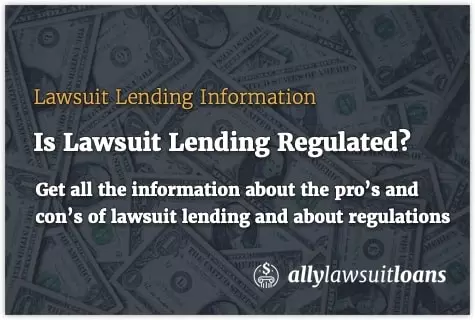
While conventional loans have been around for a long time, lawsuit loans are relatively new.
For the most part, lawsuit lending is unregulated at the federal level.
However, some states have strict laws in place for lawsuit lending companies to protect borrowers.
Since lawsuit lenders remain mostly unregulated, you must take extra care when applying for a lawsuit loan.
Here, we discuss how a lawsuit loan works and what regulations exist at both the state and federal level.
What is a Pre-Settlement Lawsuit Loan?
A lawsuit loan is a cash advance that lenders send to plaintiffs in exchange for part of their future settlement.
Typically, lenders give these loans out to those who already have a lawyer retained and have an active lawsuit.
If you get a lawsuit loan, the lender expects you to pay it back, with interest, once you receive your settlement or judgment.
Plaintiffs often use a lawsuit loan to pay for expenses while they wait for their settlement, including legal fees, medical bills, rent, and more.
Some people criticize the legal lending industry due to their high fees and lack of transparency.
This often makes applying for lawsuit loans difficult since so many lenders aren’t honest about fees, interest rates, or terms.
At Ally Lawsuit Loans, we provide our clients with this information upfront.
State and Federal Lending Laws and Regulations
Unlike other types of lending institutions, legal lending isn’t regulated by the federal government.
However, a few states have consumer protections in place due to recent legislation.
The lawsuit lending industry argues that it shouldn’t be regulated because lawsuit loans technically aren’t loans because they are non-recourse.
Non-recourse means that if the plaintiff loses their case, they don’t need to repay the loan.
Instead, the lenders consider the loan purchase of potential proceeds from a future settlement.
In Many States, Lawsuit Lending is Unregulated
The amount of regulation differs across the country, but most states don’t regulate lawsuit lending.
For example, in Texas, legal lending isn’t regulated at all and it’s very easy to obtain a lawsuit loan in the state.
This is due to the fact that Texas helped popularize contingency fees for legal representation in the US.
California handles legal funding a little differently. While the state allows most forms of lawsuit loans, they restrict funding for workers’ compensation cases.
They do this because in workers’ compensation cases the plaintiff and their attorney both receive checks for attorney’s fees and the plaintiff’s portion.
This means that the lender cannot secure their lien against the trust account of the attorney.
In contrast, Colorado heavily regulates the legal lending industry.
In 2015, the Colorado Supreme Court ruled that lawsuit loans count as traditional lending.
Thus, legal lenders must follow the same laws as traditional lenders in the state.
Find Out if a Lawsuit Loan is Right For You
At Ally Lawsuit Loans, we hold ourselves to the highest standards with transparent, risk-free lending.
Like many other legal lenders, we offer non-recourse loans that you don’t have to pay back unless you win.
However, we guarantee the lowest interest rates in the industry.
If you have any questions about pre-settlement lawsuit loans or would like to apply for funding, give one of our lending specialists a call at 844-771-2957.
Once approved, we send you cash within 24 hours.


